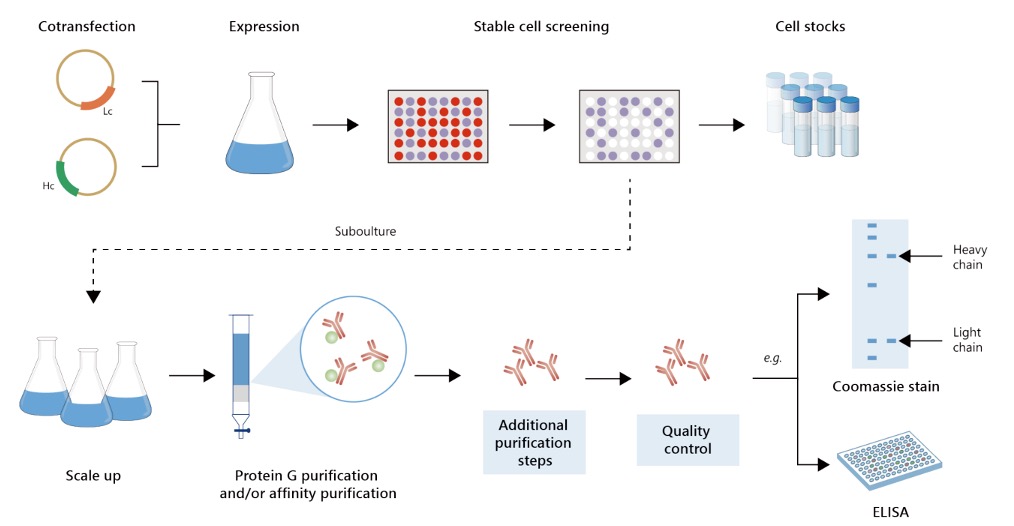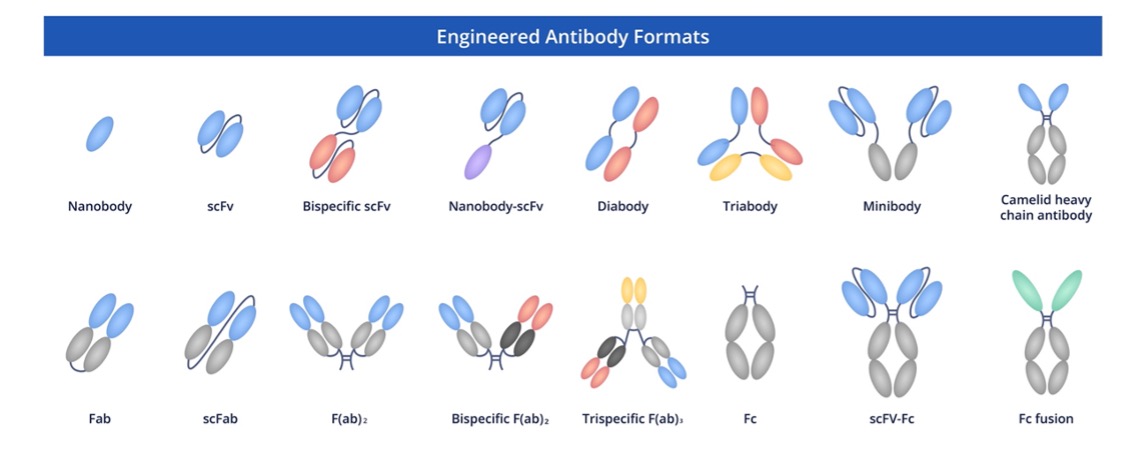 Loading...
Loading...

Anti-KCNJ11 Recombinant Antibody Products
 Loading...
Loading...Anti-KCNJ11 Products
- Recombinant Anti-Human KCNJ11 Antibody (MOB-1996z)
-
- Derivation: Mouse
- Species Reactivity: Human
- Type: IgG
- Application: WB, IHC, FuncS
-
- Species Reactivity: Human
- Application: WB
- Recombinant Anti-Human KCNJ11 Antibody Fab Fragment (MOB-1996z-F(E))
-
- Derivation: Mouse
- Species Reactivity: Human
- Type: Fab
- Application: ELISA, Nert, FuncS
- Recombinant Anti-Human KCNJ11 Antibody scFv Fragment (MOB-1996z-S(P))
-
- Derivation: Mouse
- Species Reactivity: Human
- Type: scFv
- Application: ELISA, WB, FuncS
Can't find the products you're looking for? Try to filter in the left sidebar.Filter By Tag
Our customer service representatives are available 24 hours a day, from Monday to Sunday. Contact Us
For Research Use Only. Not For Clinical Use.
Creative Biolabs is committed to supporting research efforts to find better treatments and a cure for diabetes and related metabolic diseases. For critical studies of this multifaceted disease, we offer high-quality anti-KCNJ11 (Kir6.2) recombinant antibodies. KCNJ11, the pore-forming subunit of the pancreatic KATP channel, is the final regulator of insulin secretion. We provide reliable anti-KCNJ11/Kir6.2 antibodies for studying neonatal diabetes, congenital hyperinsulinism, and the mechanism of action of sulfonylurea drugs.
KCNJ11: The Pore of the Pancreatic KATP Channel
Potassium channel subfamily J member 11, KCNJ11, also known as Kir6.2, is the pore-forming subunit of the ATP-sensitive potassium (KATP) channel found in pancreatic beta-cells. It assembles with the regulatory subunit SUR1 (ABCC8) to form the octameric channel complex. Kir6.2 has the binding site for ATP. Binding of ATP to the Kir6.2 subunit closes the channel pore and initiates membrane depolarization and insulin secretion. Gain-of-function mutations in KCNJ11 cause permanent neonatal diabetes, and loss-of-function mutations cause congenital hyperinsulinism.
Alternative Names
KCNJ11; Potassium Channel, Inwardly Rectifying Subfamily J Member 11; HHF2; KIR6.2; Inward Rectifier K(+) Channel Kir6.2; TNDM3; Potassium Channel, Inwardly Rectifying Subfamily J, Member 11; ATP-Sensitive Inward Rectifier Potassium Channel 11; Inwardly R
Background
Potassium channels are present in most mammalian cells, where they participate in a wide range of physiologic responses. The protein encoded by this gene is an integral membrane protein and inward-rectifier type potassium channel. The encoded protein, which has a greater tendency to allow potassium to flow into a cell rather than out of a cell, is controlled by G-proteins and is found associated with the sulfonylurea receptor SUR. Mutations in this gene are a cause of familial persistent hyperinsulinemic hypoglycemia of infancy (PHHI), an autosomal recessive disorder characterized by unregulated insulin secretion. Defects in this gene may also contribute to autosomal dominant non-insulin-dependent diabetes mellitus type II (NIDDM), transient neonatal diabetes mellitus type 3 (TNDM3), and permanent neonatal diabetes mellitus (PNDM). Multiple alternatively spliced transcript variants that encode different protein isoforms have been described for this gene.
Disease related genes, FDA approved drug targets, Human disease related genes, Metabolic proteins, Transporters, Voltage-gated ion channels
Membrane
Cell type enhanced (Cardiomyocytes, Inhibitory neurons, Excitatory neurons, Collecting duct cells, Enteroendocrine cells, Oligodendrocyte precursor cells)
Not detected in immune cells
Cell line enhanced (Daudi, HEK93, MCF7, SCLC-21H, U-266/84)
Interacts with ABCC8/SUR. Interacts with ABCC9/SUR2.
Ion channel, Voltage-gated channel
Anti-KCNJ11 rAb Products
Creative Biolabs' anti-KCNJ11 recombinant antibodies are engineered for high specificity and sensitivity, allowing for the consistent detection of the Kir6.2 subunit. The antibodies are validated for critical applications including co-immunoprecipitation to study the SUR1-Kir6.2 complex, and IHC to visualize the channel distribution in pancreatic islets. Our high-fidelity rAbs deliver the precision needed for diabetes research.
Table 1. Featured anti-KCNJ11 recombinant antibody products at Creative Biolabs.
| Cat. No. | Product Name | Target Species | Host Species | Applications |
| MOB-1996z | Recombinant Anti-Human KCNJ11 Antibody | Human | Mouse IgG | WB, IHC, FuncS |
| MOB-2302CT | Recombinant Mouse anti-Human KCNJ11 Monoclonal antibody (N323A/31) | Human | Mouse IgG | WB |
Customer Reviews

Recombinant Mouse anti-Human KCNJ11 Monoclonal antibody (N323A/31)
rAb Production
Creative Biolabs' modern production technologies are designed to support the rapid development of new therapeutics for the treatment of metabolic disorders. Our anti-KCNJ11 recombinant antibodies are expressed from optimized mammalian cell lines to ensure correct folding and tetrameric assembly of the pore necessary for recognition by high-fidelity antibodies.
Featured Anti-KCNJ11 Recombinant Antibody Production Platforms
Fig.1 Milligram-scale anti-KCNJ11 recombinant antibody production.
 Fig.2 Gram-scale anti-KCNJ11 recombinant antibody production.
Fig.2 Gram-scale anti-KCNJ11 recombinant antibody production.
rAb Modalities
Creative Biolabs is dedicated to serving the diabetes research community with adaptable and innovative tools. Our anti-KCNJ11 recombinant antibodies are available in a variety of customizable modalities to empower researchers around the world to uncover the fundamental mechanisms of insulin secretion.
 Fig.3 Full-length anti-KCNJ11 recombinant antibody production and modalities.
Fig.3 Full-length anti-KCNJ11 recombinant antibody production and modalities.
Power your work on diabetes therapeutics with Creative Biolabs' high-quality anti-KCNJ11 recombinant antibodies. Our products stand out with their high specificity, comprehensive validation, and exceptional consistency, giving you the ideal tools for both therapeutic development and fundamental research. Don't hesitate to contact our specialists today.



